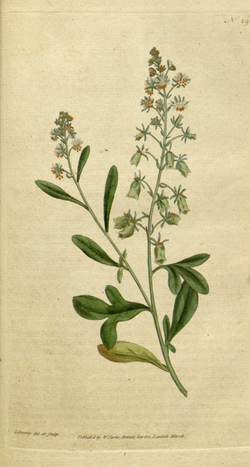Biology:Reseda odorata
| Reseda odorata | |
|---|---|

| |
| Scientific classification | |
| Kingdom: | Plantae |
| Clade: | Tracheophytes |
| Clade: | Angiosperms |
| Clade: | Eudicots |
| Clade: | Rosids |
| Order: | Brassicales |
| Family: | Resedaceae |
| Genus: | Reseda |
| Species: | R. odorata
|
| Binomial name | |
| Reseda odorata | |
Reseda odorata is a species of flowering plant in the reseda family known by many common names, including garden mignonette[1][2] and common mignonette. It is probably native to the Mediterranean Basin, but it can sometimes be found growing in the wild as an introduced species in many parts of the world.[3] These introductions are often garden escapees; the plant has long been kept as an ornamental plant for its fragrant flowers, the essential oil of which has been used in perfumes.[3] This is an annual herb, producing branching erect stems to 80 centimeters in maximum height. The inflorescence is a spike-like raceme of many flowers. The fragrant flower has six white to yellowish or greenish petals, the upper ones each divided into three narrow, finger-like lobes.[4] At the center of the flower are up to about 25 stamens tipped with large dangling orange anthers.
Common names
Mignonette, Egyptian Mignonette. [5], Sweet Reseda [6], Egyptian Rocket [7]
References
- ↑ "BSBI List 2007" (xls). Botanical Society of Britain and Ireland. http://www.bsbi.org.uk/BSBIList2007.xls. Retrieved 2014-10-17.
- ↑ "Reseda odorata". Natural Resources Conservation Service PLANTS Database. USDA. https://plants.usda.gov/core/profile?symbol=REOD. Retrieved 20 October 2015.
- ↑ 3.0 3.1 Flora of North America
- ↑ Hickman, James Craig (1993). "UC/JEPS: The Jepson Manual: Higher Plants of California". http://ucjeps.berkeley.edu/cgi-bin/get_JM_treatment.pl?6578,6581,6585. Retrieved 2018-06-07.
- ↑ PIRIE, Mary (1860). Flowers, Grasses, and Shrubs. A popular book on Botany. Illustrated.[1]
- ↑ harrison, joseph (1849). the floricultural cabinet. [2]
- ↑ Loudon (Jane), Mrs (1840). The Ladies'flower-garden of Ornamental Annuals.[3]
Wikidata ☰ Q159158 entry

